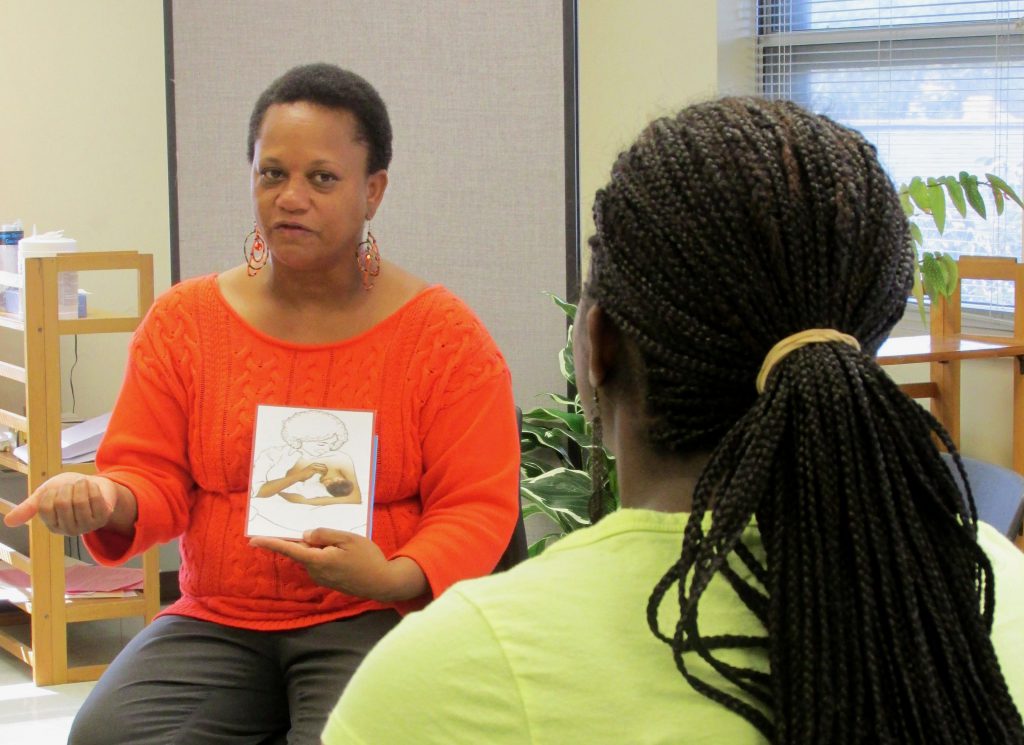Counselors Offer Guidance on Breast Feeding
Milwaukee’s WIC program provides counseling for 821 women annually.

Dalvery Blackwell, founder of the Milwaukee-based African American Breastfeeding Network, says peer counseling programs allow counselors an opportunity to not “put women in a box and define who and what they are.” She’s shown providing maternity advice at the now-closed Marquette Neighborhood Health Center in 2013. NNS file photo by Kara Cucchiarelli.
After having a baby, mothers face a choice: Will they breastfeed or feed from the bottle?
The difference could be major. In recent studies, breastfeeding was linked to a major reduction in infant mortality. Infants and mothers who breastfeed are also at less risk for a number of health conditions, including asthma and diabetes.
Peer support programs through the Women, Infants and Children, or WIC, program are available throughout the city, and Milwaukee’s WIC program provides counseling for 821 women annually. Grant funding for the program is now over $74,000, an increase of 50% from 2020.
Natalie Alcaraz, WIC program manager for the Milwaukee Health Department, said the increased funding will go to hiring additional staff and increasing community outreach. The team will have four peer counselors by the end of the year and has a stated goal to reach mothers at Ascension St. Joseph hospital.
WIC will also host Baby Cafés for mothers in the near future, with the goal of holding two a month, said Erica Olivier, maternal and child health director for the Milwaukee Health Department. The Baby Cafes are events where mothers can come and have their questions answered about maternal health.
Peer counselors also operate out of different organizations in the community, all with the common goal of reflecting the communities they serve.
Dalvery Blackwell, founder of the Milwaukee-based African American Breastfeeding Network, said peer counseling programs are important because they allow counselors an opportunity to not “put women in a box and define who and what they are.”
Blackwell said that her organization intentionally hires women from the community.
Blackwell said the breastfeeding initiation rate for Black women was about 58%, about 12% lower than all other women, including those in the Latinx population. She believes that for many Black women, this is because of a lack of positive examples.
“When you don’t see it, you don’t believe it can happen for you,” Blackwell said. “I’ve heard women say, ‘That’s not for me, that’s for the woman who’s going to stay at home with her kids.’”
Blackwell said she noticed that Black women were uncomfortable exposing their breasts to non-Black women in clinical settings during her own time working with WIC. She also said Black women were more likely to have jobs in workplaces that were not family-friendly or accommodating for breastfeeding.
Lauren Christie, the breastfeeding coordinator at Sixteenth Street Community Health Centers, said new mothers rely on other mothers for advice.
“It lands differently from someone you might see at church,” Christie said.
Breastfeeding resources
- Christie administers a Facebook group for WIC recipients in Milwaukee County where they can ask questions about breastfeeding and receive input from staffers and the community. The group has over 200 members. Any mother receiving WIC benefits in Milwaukee County can join.
- To get involved with Milwaukee Health Department WIC, call 414-286-8821 for the Southside Health Center, 414-286-8820 for the Northwest Health Center and 414-286-8813 for Keenan Health Center.
- To get involved with the African American Breastfeeding Network, visit its website or call 414-617-3441.
- To get involved with Sixteenth Street breastfeeding support, call 414-643-7554.
Peer support counselors offer guidance on breastfeeding was originally published by the Milwaukee Neighborhood News Service.





















